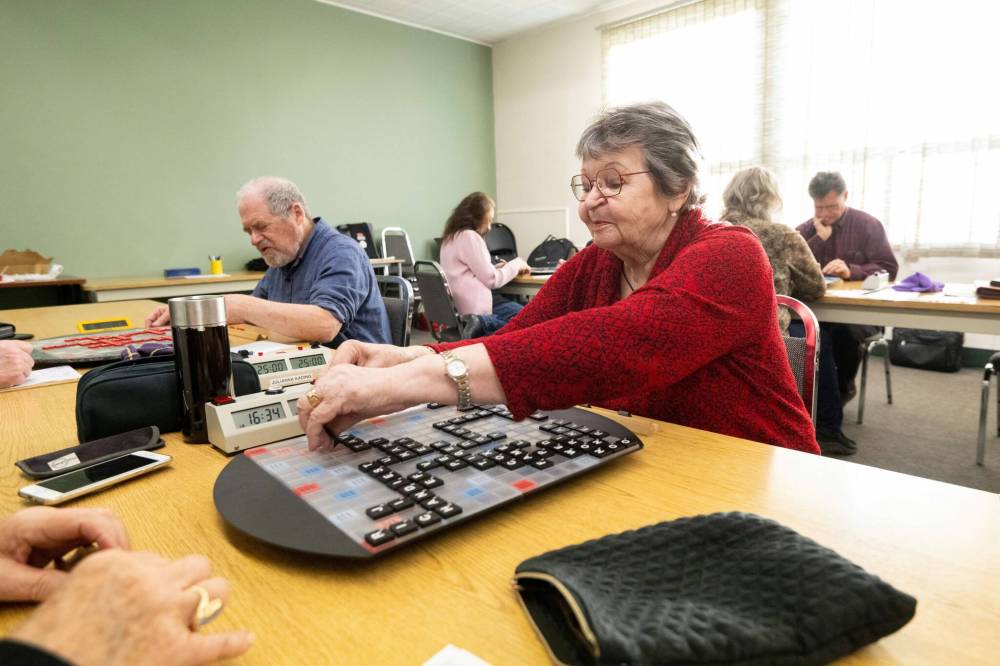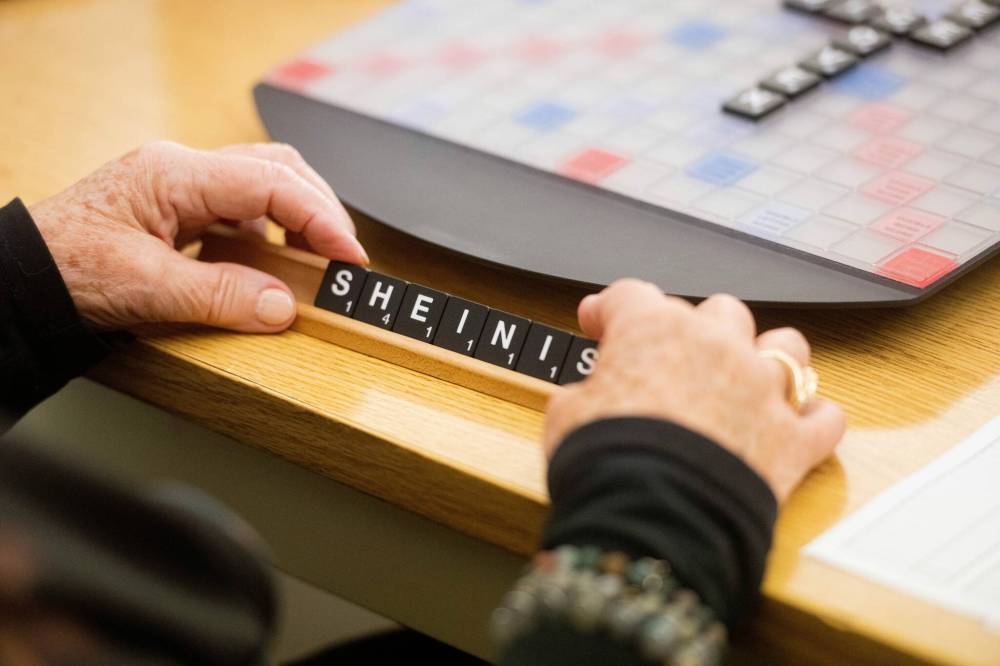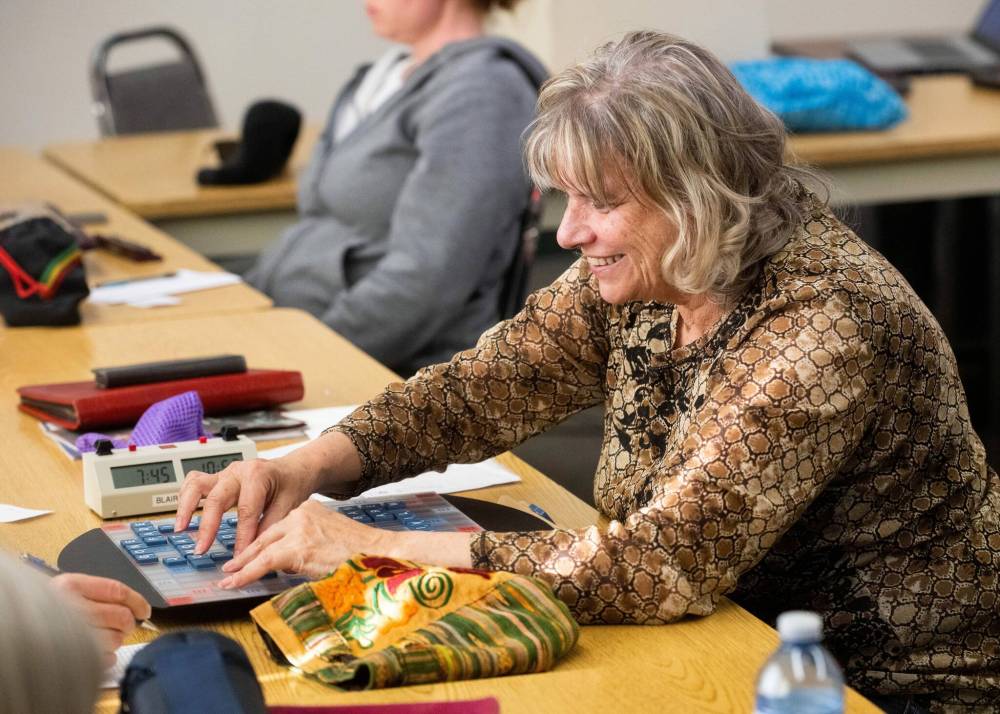How do you spell fun? Winnipeg Scrabble Club has been bringing letter-heads together for almost three decades
Read this article for free:
or
Already have an account? Log in here »
To continue reading, please subscribe:
Monthly Digital Subscription
$1 per week for 24 weeks*
- Enjoy unlimited reading on winnipegfreepress.com
- Read the E-Edition, our digital replica newspaper
- Access News Break, our award-winning app
- Play interactive puzzles
*Billed as $4.00 plus GST every four weeks. After 24 weeks, price increases to the regular rate of $19.95 plus GST every four weeks. Offer available to new and qualified returning subscribers only. Cancel any time.
Monthly Digital Subscription
$4.99/week*
- Enjoy unlimited reading on winnipegfreepress.com
- Read the E-Edition, our digital replica newspaper
- Access News Break, our award-winning app
- Play interactive puzzles
*Billed as $19.95 plus GST every four weeks. Cancel any time.
To continue reading, please subscribe:
Add Free Press access to your Brandon Sun subscription for only an additional
$1 for the first 4 weeks*
*Your next subscription payment will increase by $1.00 and you will be charged $16.99 plus GST for four weeks. After four weeks, your payment will increase to $23.99 plus GST every four weeks.
Read unlimited articles for free today:
or
Already have an account? Log in here »
Hey there, time traveller!
This article was published 06/04/2023 (1053 days ago), so information in it may no longer be current.
National Scrabble Day falls annually on April 13 and as L-U-C-K would have it, this year’s event coincides perfectly with the Winnipeg Scrabble Club’s weekly, Thursday night get-together at Canadian Mennonite University’s south campus.
Funnily enough, Julie Kading, one of the local chapter’s directors, didn’t always know there was a date on the calendar reserved for the popular word game, which was invented 85 years ago by American architect Alfred Mosher Butts, and which was inducted into the National Toy Hall of Fame in 2004, alongside G.I. Joe and a rocking horse.
Mike Sudoma / Winnipeg Free Press Julie Kading, one of the Winnipeg Scrabble Club’s directors, lays down some tiles during the club’s weekly get-together at Canadian Mennonite University’s south campus.
“I just noticed that recently, so no, if people are expecting us to do anything special (this) Thursday, like serve cake, that won’t be happening,” she says with a laugh, seated in a classroom at CMU, where five pairs of players are currently locked in battle.
Hey, who has time to blow out candles, anyway?
Club rules dictate that individual matches are a set length. According to Kading, that can get a tad unnerving, especially when it’s late in the action, and you’re staring down at a rack populated by nothing but vowels.
“Every so often a newcomer will show up, only to find it somewhat overwhelming to play with a clock, ” she continues, nodding at a digital timer that, pre-game, is set to 25 minutes, per participant. “Or they’ll be surprised they can’t keep a dictionary nearby, the way they might do in ‘kitchen’ Scrabble. We play for fun, of course, but the ultimate goal is to improve our skills, and maybe learn a new word or two.”
The Winnipeg Scrabble Club, which was founded in 1995, belongs to the National Scrabble Association, a New York-based body that oversees close to 300 individual clubs, in cities and towns throughout North America.
Kading joined in 1998, back when gatherings were held at a restaurant in the West End. (Insert your own, “Waiter! There’s an F, L and Y in my soup!” joke, here.)
The admitted wordsmith had enjoyed Scrabble since she was a child, but lacking anybody to play the game with regularly — her husband could take or leave it, she says with a shrug — she decided to give the club a go, after hearing about it on the radio. She may have been beaten handily a few times early on, but she stuck with it, choosing to follow the club to a larger facility on Kenaston Boulevard in the early 2000s, and again when it switched over to its present digs, at 600 Shaftesbury Blvd., seven years ago.
“At one point, membership was just over 30. Unfortunately, a lot of people didn’t come back after we took a two-year break because of COVID, so these days, 12 is a pretty good turnout,” she says, mentioning a nightly, $5-per-person charge covers the cost of renting a classroom from 6:30-10:30 p.m., every Thursday evening.
To demonstrate how a night typically unfolds, Kading, who has participated in sanctioned Scrabble tournaments in Calgary, Saskatoon and Las Vegas (yes, Canadian spellings such as “colour” and “theatre” count, if you’re playing south of the border) takes a seat opposite five-year member Blair Rutter, whose average score is in the 370-range, as per the club’s website, winnipeg.scrabbleclub.org.
Mike Sudoma/Winnipeg Free Press Blair Rutter ponders his options before making a play at a Winnipeg Scrabble Club meetup recently.
Pulling his initial seven letters out of a cloth bag held above his head to negate cheating, Rutter, the 20-year president of the Manitoba Chess Association, says there aren’t too many tiles he hates seeing in his possession, though, to him, the letter S and blank tiles are the best of the bunch.
“Well, would you look at that,” the retiree announces seconds later, when he kicks things off by spelling out “seedier,” for which he not only receives a double-word score, but an extra 50 points for utilizing all his letters in one fell swoop. That’s called a bingo, he mentions, as he writes his points down on a provided card. (The club supplies everything you need to play, though it’s OK to BYOB — bring your own board — if that’s what you prefer.)
Kading compliments Rutter on the move, before spelling out “adzing,” thereby getting rid of the always troublesome Z.
Excuse us? Adzing?
“I believe it’s a cutting tool, but I’m not 100 per cent certain,” Kading replies, noting a player isn’t required to know what a word they play means. They just have to be sure it’s acceptable, as per the club’s “bible,” an online version of the Official Scrabble Player’s Dictionary.
If an opponent isn’t certain what was played is an actual word, as is the case a moment later when Rutter spells out “bonce,” they reserve the right to challenge. If the challenge is upheld, the word is removed, Rutter says. But if the word is valid, the person who posed the challenge loses a turn.
Good thing Kading elected not to call Rutter on the word. A quick check tells us it’s a British term for head, as in, “He bumped his bonce on the ceiling.”
Mike Sudoma / Winnipeg Free Press A club member considers possible word options for the letters on their rack.
To our right is a game involving Adrianne Veters, a relative newcomer who joined the club in November. Her father taught her how to play Scrabble 30 years ago, when she was eight, and she recalls it took her 10 years until she was able to beat him “legitimately.”
“I’d always thought I was OK at (Scrabble), but I was interested to see how I’d stack up against better players,” says Veters, who belongs to a darts league and describes herself as competitive by nature. “I didn’t do too great that first night — I think I won one out of four games — but it’s a good crowd and it falls on a night of the week when I don’t have too much else going on, so I’ve continued to come out.”
Although the club offers new members a so-called cheat sheet that lists admissible entries such as two-letter words (Ae? Mm?? Ut???) along with Q-words that don’t require a U (qat, cinq, qis), Veters said thanks, but no thanks, feeling she was better off watching and learning, than by committing a sheet of paper to memory. (C’mon, not even “short X words” like doux, mixt and xyst?)
Veters says friends of hers are often surprised to learn there’s a group that plays Scrabble on a regular basis, when she lets them know what she’s been up to. That said, she has convinced at least one other person to join her.
“My brother said he’ll come with me, one of these nights. He actually built a backyard Scrabble board measuring five feet by five feet, along with all the tiles. So yeah, I guess you could say the game is a big part of my family.”
Mike Sudoma / Winnipeg Free Press Jackie Rittberg smiles while constructing a word on the Scrabble board.
Back to Kading and Rutter, it appears the latter is safely in the lead, thanks to an 86-point advantage and only a few tiles left to be played. After finishing with the word “jut,” Kading congratulates Rutter, who, while we were gone, nailed a second bingo, by spelling out “deletes,” using an A from a word already on the board to attach to his D.
The two can now take a breather, as they wait for other games to be completed, which will determine who their next opponent/victim will be.
He can’t count the number of games he’s played to date, Rutter says while he’s waiting, but that doesn’t mean he doesn’t still get a rush when he’s arranging letters back and forth, and a word suddenly springs to mind, as occurred earlier, when he noticed he had what it took to spell “beckon,” with an all-important double-letter score on the K.
“I feel the same way,” Kading pipes in, “but I guess what I love most about Scrabble is that it’s never the same game, twice.”
Him (hymn), too (to and two), comments Rutter.
david.sanderson@freepress.mb.ca
Dave Sanderson was born in Regina but please, don’t hold that against him.
Our newsroom depends on a growing audience of readers to power our journalism. If you are not a paid reader, please consider becoming a subscriber.
Our newsroom depends on its audience of readers to power our journalism. Thank you for your support.









